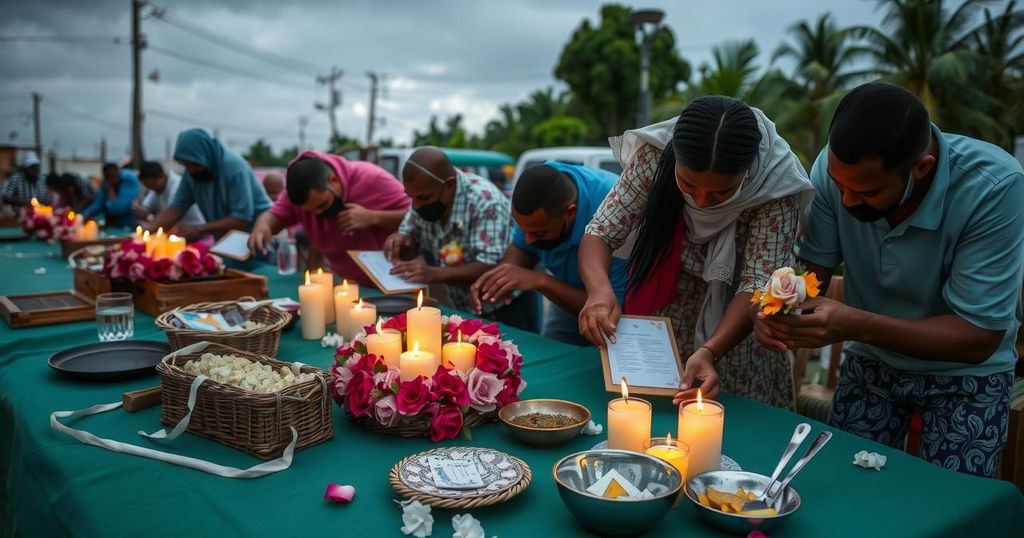Comoros Declares National Mourning After Catastrophic Cyclone Chido
Comoros has declared a week of national mourning following Cyclone Chido, which devastated Mayotte and caused fears of hundreds of deaths. The storm resulted in extensive damage and essential resource shortages, prompting an urgent humanitarian response. France has mobilized military support for rescue efforts as the region grapples with the aftermath of this unprecedented natural disaster.
On Monday, the government of Comoros declared a week of national mourning following the devastation caused by Cyclone Chido in neighboring Mayotte. The cyclone, which recorded winds exceeding 220 kilometers per hour, has resulted in fears of hundreds of fatalities, particularly among the impoverished populations of shantytowns where many Comorans reside. President Azali Assoumani announced that the mourning period would remain in effect until Sunday, in recognition of the significant loss of life and catastrophic damage to infrastructure.
Mayotte, which opted to remain a French territory during the independence referendums of 1974 and 1976, is situated only 70 kilometers from Comoros. Official estimates indicate that half of Mayotte’s population of 320,000 is comprised of migrants, chiefly Comorans. Authorities are notably concerned that many undocumented migrants did not seek refuge in shelters prior to the cyclone due to apprehensions about deportation. Consequently, the extent of damage and casualties in the shantytowns, where structures were rendered to rubble, suggests a potentially high death toll.
Cyclone Chido is reported as the most severe storm to impact Mayotte in nearly nine decades and has been classified as a category four cyclone, indicating its unprecedented ferocity. In the aftermath, France has mobilized military resources and naval vessels to facilitate rescue operations and deliver essential supplies. The destruction of power and communication infrastructure has exacerbated the challenges faced by the emergency response teams as they endeavor to reach those affected.
Moreover, there are urgent needs for basic supplies such as water and food, as residents begin to experience shortages. Senator Salama Ramia highlighted the critical situation stating, “There’s no water, no electricity. Hunger is starting to rise. It’s urgent that aid arrives, especially when you see children, babies, to whom we have nothing concrete to offer.” The humanitarian crisis is compounded by the infrastructural damage to the main hospital and the food supply chain, emphasizing an urgent need for international aid.
In summary, this catastrophic event has raised significant concerns over loss of life and infrastructure in Mayotte, with predictions of a death toll that could reach into the thousands. As rescue and recovery efforts continue, the region’s vulnerability underscores the importance of a prompt and coordinated response to the crisis.
Comoros and Mayotte are part of the Comorian archipelago located in the Indian Ocean between Madagascar and the African mainland. While Mayotte chose to maintain French territorial status in the 1970s, Comoros declared independence. The two territories have since faced challenges related to immigration, especially as many Comorans migrate to Mayotte in search of better opportunities. Cyclone Chido, a destructive weather event, has caused unprecedented damage and raised concerns about humanitarian needs in the region, aptly highlighting the relationship between the two islands and their resilience in the face of natural disasters.
The declaration of a week of mourning in Comoros reflects the profound impact and devastation caused by Cyclone Chido. With the potential loss of hundreds of lives, particularly within vulnerable populations in shantytowns, immediate humanitarian assistance is imperative. As rescue efforts advance amid significant infrastructural challenges, the call for aid is increasingly urgent, underscoring the need for international support to address the humanitarian crisis in Mayotte and the broader region.
Original Source: www.arabnews.com




Post Comment